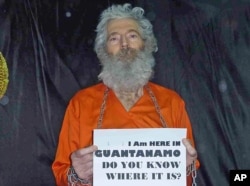Iran and the United States each released prisoners Saturday in a complex swap agreed on just before diplomats in Vienna announced implementation of a nuclear pact between a group of global powers and Iran.
The freed Americans include Washington Post correspondent Jason Rezaian, held more than 500 days on espionage charges that have been refuted repeatedly by the U.S. government, his employer, family and friends.
A Christian pastor and an Iranian-American who was a member of the U.S. Marine Corps also were being freed. In all, Iran was to release five Americans, U.S. officials said.
Nuclear deal announcement expected
In Vienna, where diplomats gathered to await an announcement that the nuclear deal with Iran was being implemented, U.S. officials said the agreement on releasing prisoners was the outcome of 14 months of negotiations, concluded in the past 24 hours. They avoided describing the arrangement as a "swap" of prisoners, calling it instead a "humanitarian gesture."
The U.S. is releasing seven Iranians who were either were already in prison or were facing criminal charges for violating economic sanctions. A brief official statement in Washington said the United States was "offering clemency" to the seven, and also dropping charges against 14 other Iranians outside the country.
U.S. officials said they were dropping "red notice" arrest warrants filed with Interpol for the 14 Iranians, after "it was assessed that extradition requests were unlikely to be successful” — apparently because they are in Iran.
Airbus deal
In another major development related to the unfolding story of the nuclear agreement's implementation and the prisoners' release, reports in the Middle East late Saturday said Iran was about to announce a deal with the European consortium Airbus to buy 114 passenger aircraft — a mammoth purchase that cash-starved Iran presumably could only afford once it is free from economic sanctions and resumes selling its extensive oil production on open markets.
Vienna meeting
U.S. officials including Secretary of State John Kerry were in Vienna Saturday, supposedly on the threshold of announcing full implementation of the landmark nuclear agreement between Tehran and the major powers — the United States, Britain, France, Germany, China and Russia.
The deal calls for Iran to curb its nuclear development program in exchange for the lifting of international sanctions that have hobbled its economy.
But as the day dragged on and details of the prisoner-exchange story came in from Tehran and other capitals, a U.S. official in Vienna said finalizing the nuclear agreement was awaiting "some technical clarifications currently taking place."
U.S. officials in the Austrian capital said the freed Americans were to be flown from Iran to Switzerland, and then to a U.S. military hospital in Germany for medical treatment.
The fourth prisoner Tehran released was identified as Nosratollah Khosravi-Roodsari, about whom little was immediately known. The fifth American leaving Iran, student Matthew Trevithick, had been detained for 40 days while he was in Iran for an intensive language program to increase his fluency in Dari, a language closely related to Farsi.
Tehran's public prosecutor, Abbas Jafari Dowlatabadi, said the prisoners' release was "in line with orders from the Supreme National Security Council."
The Washington Post's Rezaian, its Tehran bureau chief, was convicted of espionage in a secret trial last year, but his sentence never had been disclosed. He holds dual U.S. and Iranian citizenship.
Abedini, a pastor from the western U.S. state of Idaho, was detained in 2012 and accused of compromising Iran's national security, presumably because of Christian proselytizing in the Muslim country. He had previously been arrested in 2009 and released after promising to stop organizing churches in homes. When he was arrested in 2012, he was running an orphanage.
The U.S. Marine, Amir Hekmati, was arrested during a family visit to Tehran in 2011.
Robert Levinson
As part of the prisoner release, Iran agreed to try to determine the fate of Robert Levinson, a former U.S. FBI agent who disappeared there in 2007 while working on a project that has been linked to the Central Intelligence Agency. U.S. officials have said they are not sure he is still alive, but said that Iran has "committed to continue cooperating with the United States to determine the whereabouts of Robert Levinson."
The lengthy and complex negotiations with Iran about its nuclear program climaxed in an agreement announced last July, but there was no mention of the prisoners issue at the time. President Barack Obama and other senior U.S. officials have said they repeatedly demanded the release of Iran's American prisoners, but there was nevertheless widespread criticism of the administration for failing to secure a firm agreement on the prisoners' release.
















